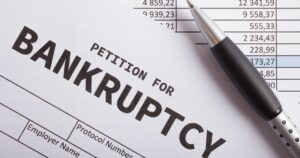How much debt should you be in before filing bankruptcy? Technically, there is no minimum debt amount required to file for bankruptcy, but there are limitations on how high your debts can go.
For example, if you want to file for Chapter 13 bankruptcy, your secured debts cannot exceed $1,257,850, and your unsecured debts cannot total more than $419,275. Your debt load, however, is only one factor the courts consider when deciding if you have enough applicable debts to file for bankruptcy. These factors are what you and your attorney will consider when determining which type of bankruptcy you qualify for and if you will qualify for bankruptcy at all.
No Minimum Debt Required
The guidelines for bankruptcy do not have any set minimums to file. The amount of debt is a factor, however, when considering whether bankruptcy is the right choice. Other items that your attorney would consider financially include:
- If you can afford to pay back your debts with your existing income;
- If bankruptcy is the only way to reach a solution or if creditors would be willing to work out favorable terms outside of bankruptcy;
- The types of debts you have and their balances; and
- Your specific circumstances.
Can You Currently Afford to Pay Your Debts?
One of the most significant factors is comparing your existing income, disposable income, and how many debts you have to see if you could realistically pay for your debts.
Before you can file for bankruptcy, you need to consider your income (or household income if filing jointly). When your income is high enough to prepay your debts, it is unlikely you would qualify for Chapter 7. You can, however, possibly qualify for Chapter 13 bankruptcy.
If you still have a good amount of income, then it may be best to wait on filing for bankruptcy and look into alternatives if you do have a chance at paying off debts without going through bankruptcy. After all, you are limited in how often you can file. And once you file, bankruptcy will remain on your credit report for several years, which will affect your overall credit rating and creditworthiness.
Will Creditors Work with You?
Creditors often prefer to work with a client than go through bankruptcy. Because in bankruptcy, they are paid nothing or pennies on the dollar. Sometimes, a creditor might work with you to satisfy the debt outside of court.
It would be best if you did not negotiate these debts without an attorney, however. You still want someone who can negotiate a better repayment plan, stop creditors from garnishing wages or filing lawsuits against you, and prevent them from foreclosing on your home.
Considering the Types of Debts and Their Amounts
The most important factor is what type of debts you have and how much of them you have.
Certain debts cannot be discharged in Chapter 7 bankruptcy. And if the majority of your debts fall into that category, then you might find Chapter 13 better for your financial situation.
Some debts you cannot discharge include:
- Alimony
- Child Support
- Taxes
- Student Loans
Therefore, if the vast majority of your debts fall into this category and you only have a few that would fall under the Chapter 7 category, then you may consider Chapter 13 instead. With Chapter 13, you can pick a three to a five-year repayment plan that suits your budget and helps you still get the protection of bankruptcy while addressing all debts – including those you usually cannot discharge in Chapter 7.
Is Bankruptcy the Right Choice for You?
The best way to determine if bankruptcy is right for you is to consider each type of bankruptcy, your total amount of debts, and which category they fall under. Most importantly, how far into your debts are you?
Do you have creditors coming after you with threats of lawsuits? Are your wages being garnished? Are you at risk of losing your home?
All of these are factors to consider when deciding if bankruptcy is the best route.
Most importantly, you should consult with an attorney.
How an Attorney Helps You Decide
When you meet with a bankruptcy attorney for an initial consultation, they will assist you in deciding whether bankruptcy is right for you and which type to use by:
- Looking over Current Debt Amounts and Category: Before your consultation, you will be asked to bring along statements of outstanding debts, letters of intent to lien, judgments, and totals of your existing debts. The attorney will then review those, classify them by which qualify for Chapter 7 and which do not, and look over other documentation.
- Examining Your Budget, Spending Habits, and True Disposable Income: Next, the attorney will look at your budget and your actual disposable income. You might think you do not have disposable income, but if you have massive spending on unnecessary items every month, the court would consider that money something you can use to pay down debts.
- Considering Your Health and Financial Situation Overall: Were you recently laid off from work? Have you been unable to find work? Perhaps you have a medical condition that now limits how much work you can do? These do factor into your ability to pay down debts in the future – and something your attorney must know.
- Discussing Your Options for an Informed Decision: Once your attorney goes over all of the documentation, he or she will then let you know their thoughts, which option they feel is best, and whether you disqualify for any type of bankruptcy.
Ready to Explore Your Options? Speak with a Bankruptcy Attorney Today
If you are considering bankruptcy, the best step to take is to schedule a consultation with an attorney. Contact us today for a no-obligation consultation.

